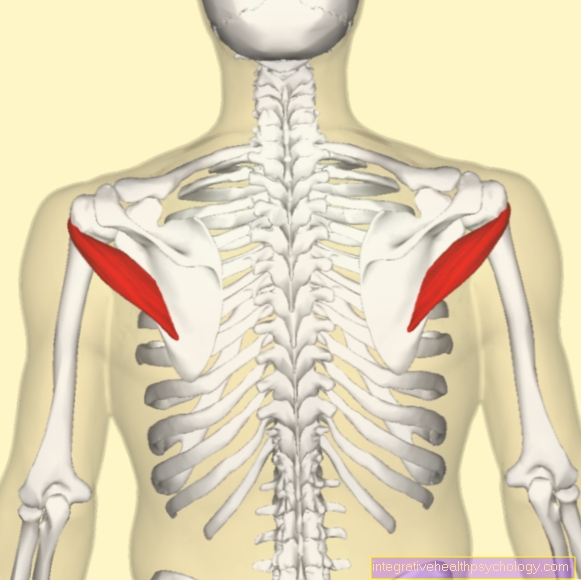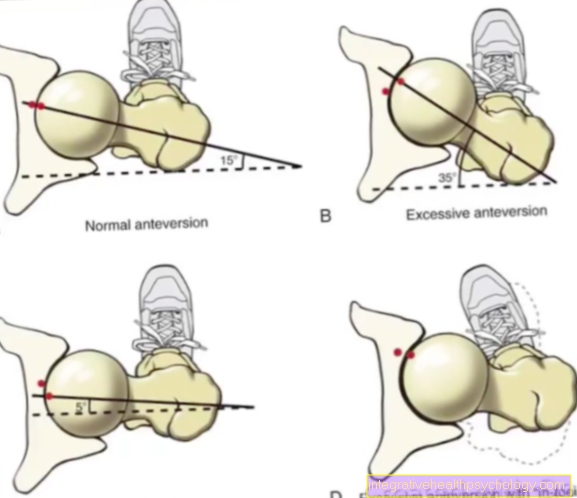Which drugs affect the way the pill works?
Introduction - How can drugs affect the effectiveness of the pill?
Interactions with other drugs can make the contraceptive less effective. Conversely, hormonal contraceptives (pill) can also change, increase or weaken the effectiveness of drugs. Before taking any medication, the prescribing doctor should be informed about the use of the pill. Whether the pill may be less effective can also be found in the package insert for the medication. If you are unsure, you should definitely consult a doctor or pharmacist.
If the effectiveness of the pill is influenced by the use of other medication, it is essential to use additional contraceptives, as the contraceptive effect is no longer guaranteed. This can lead to unwanted pregnancies. The first sign of the reduced effectiveness of the pill may be the occurrence of intermenstrual bleeding.

Drugs with influence
- ASA or acetylsalicylic acid: These painkillers, also known as aspirin, are used as anticoagulants. ASA can basically interact with other drugs, which is why it should not be taken without an indication and, if possible, in consultation with a doctor or pharmacist. ASA can change the lining of the stomach and possibly affect the absorption of the pill. There are no clear indications of the reduced effectiveness of the pill, but there have been spontaneous reports of unwanted pregnancies when taking acetylsalicylic acid.
- Etoricoxib (Arcoxia®): Like ASA, the coxibs belong to the non-steroidal anti-inflammatory painkillers. They are associated with a lower risk of gastrointestinal bleeding and are offered as an alternative. Even with coxibs, especially in long-term therapy, there may be interactions with hormonal contraceptives and other drugs. An interaction with the pill cannot be ruled out with certainty.
For more information, see: Arcoxia®
- Antidepressants: Imipramine is a medicine used to treat depression. It belongs to the group of so-called tricyclic drugs. The tricyclic antidepressants are an older group for the treatment of depression that have been shown to be effective in the treatment, but also have many side effects. A variety of drug interactions can also occur. The attending physician should therefore be informed about the use of antidepressants. The pill can make imipramine less effective and increase its side effects at the same time. In addition, taking imipramine can also decrease the effectiveness of the pill. Patients taking imipramine should discuss contraception options with their doctor.
- Griseofulvin: The active ingredient griseofulvin is used to treat fungal infections of the skin and hair caused by so-called dermatophytes (thread fungi). So it is a so-called Antifungal agent or fungicides. It is taken in the tablet form. The effectiveness of the pill may be impaired during therapy with griseofulvin. Reliable contraception is of great importance because griseofulvin has teratogenic effects, i.e. it can cause deformities in the embryo.
For more information, see: Fungal infection drugs
- Azoles: Systemic therapy of fungal diseases with so-called antimycotics (fungal agents) can affect the effectiveness of the pill. In addition to griseofulvin, this also applies to the so-called Azole antifungal drugsthat are used in fungus treatment. The active ingredients belong to the group Ketoconazole and Itraconazole.
- Metoclopramide: Metoclopramide is a drug used to treat nausea and vomiting. The active ingredient is also known by the name Paspertin. In general, it should be noted that vomiting can reduce the effectiveness of the pill, as the active ingredient is sometimes not completely absorbed through the digestive system. In addition, an interaction between metoclopramide and hormonal contraceptives cannot be ruled out.
- Barbiturates: These are drugs that increase inhibitory signals in the brain. They have a calming, soporific effect or induce anesthesia. Today barbiturates are no longer used as sleeping pills because they carry a high risk of sometimes life-threatening side effects. However, they are used in epilepsy therapy. Barbiturates in the long-term therapy of epilepsy (the active ingredient phenobarbital is used here) can accelerate the breakdown of hormonal contraceptives and cause the pill to lose its effectiveness.
Read more on the subject at: Sedatives
- Ritonavir: Ritonavir is a medicine used to treat HIV and AIDS, it is something called a medicine Antiviral. Ritonavir interacts with the pill and can make its effects less effective; additional contraceptive measures should be used. In addition to ritonavir, numerous other antivirals interact with the pill and can weaken their effect. These include amprenavir, atazanavir, delaviridine, efavirenz, fosamprenavir, lopinavir, tiprinavir and other antivirals used in HIV treatment.
- Modafinil: Modafinil is a drug used to treat narcolepsy. It can be used to prevent sleep attacks and to keep the patient awake during the day. Modafinil can make hormonal contraceptives less effective. Therefore, additional contraceptive measures should be used during the entire period of use and up to two months after stopping the drug.
Also read the article on the topic: Failure of the pill to work such as The morning-after pill
Which antibiotics affect the pill?
In principle, all antibiotics can affect the effectiveness of the pill, especially through changes in the gastrointestinal tract. For example, diarrhea, which is a common side effect of antibiotics, can reduce the time the drug stays in the digestive system and affect absorption.
- There is clear evidence of reduced effectiveness of the pill for the antibiotic Rifampicinused in tuberculosis treatment. Like some other antibiotics, it affects the metabolism of the pill and the protection against unwanted pregnancy is impaired.
- Corresponding information is also available from the group of Macrolides (Clarithromycin, Erythromycin, Azithromycin and others).
- There are also spontaneous reports of unwanted pregnancies for various active ingredients from the group of Penicillins (Penicillin G, Amoxicillin, Ampicillin, Oxacillin) and the group of Tetracyclines such as Cephalosporins.
There are similar reports for the broad spectrum antibiotics Chloramphenicol and Neomycin, as well as the combination Co-trimoxazole.
In contrast, there is no evidence of reduced effectiveness for the fluoroquinolones Ciprofloxacin and Ofloxacin. Also Doxycycline and Metronidazole do not show any significant interaction with the pill.
In principle, the attending physician should be consulted in detail when taking an antibiotic. Signs of reduced effectiveness can be the occurrence of intermenstrual bleeding during an otherwise regular cycle. In case of doubt, additional contraceptive measures should be used for the duration of treatment and the following month in order to provide full protection against unwanted pregnancy.
You can find an overview of the topic here: Antibiotics
Sleeping pills
There are a variety of drugs that can be used as sleep aids (so-called Hypnotics) can be used. Some of these can affect and weaken the effectiveness of the pill. Patients who are prescribed sleeping pills should inform their doctor about the use of hormonal contraceptives and, if necessary, resort to additional contraceptive measures. The following groups belong to the sleeping pills:
- Antihistamines: This includes, for example Diphenhydramine. Antihistamines are used in the treatment of nausea and vomiting and also have antiallergic effects. They also have a sedating effect. Diphenhydramine does not seem to affect the pill's effectiveness.
- Benzodiazepines: Benzodiazepines are used as sedatives and sleeping pills. Representatives of this group include, for example Lorazepam, Flurazepam, Midazolam (known under the name Dormicum), Diazepam (Valium) and others. Benzodiazepines are powerful drugs and interact with many other drugs. The effectiveness of the pill may be reduced. The pill can also affect the way benzodiazepines work and increase the risk of side effects.
- Promethazine: This is a neuroleptic and is primarily used nowadays as a sleeping and sedative. Taking oral contraceptives can inhibit the breakdown of phenotiazines and increase their effects. This increases the risk of side effects from the drugs. At the same time, the drugs can influence the effectiveness of the pill, which means that adequate protection against unwanted pregnancy cannot be guaranteed.
You can find an overview of the topic here: Sleeping pills
Anti-seizures (epilepsy)
Antiepileptics are medicines used to treat seizures in the context of epilepsy. In principle, all anti-epileptic drugs can interact with the pill, especially older drugs interfere with the liver metabolism and the breakdown of drugs. Both a faster and a slower breakdown of the pill lead to a weakening of the contraceptive effect.
Clear indications of this were found with the following anti-epileptic drugs: Carbamazepine, felbamate, oxcarbazepine, phenytoin, phenobarbital, primidone and Topiramate (in the dosage over 200mg per day). This also includes “newer” anti-epileptic drugs.
However, there are also a number of drugs that do not seem to reduce the effectiveness of hormonal contraceptives. Nevertheless, an interaction cannot be ruled out; this also applies to the effectiveness of the respective anti-epileptic, which can also be changed. This is especially true for Lamotrigine: Although the effect of the pill does not seem to be diminished, there is an increased excretion of lamotrigine when taken at the same time and thus a decrease in the effectiveness of the anti-epileptic drug. Seizures can result from low lamotrigine levels.
Medicines that do not seem to decrease the effectiveness of the pill are Ethosuximide, gabapentin, levetiracetam, pregabalin (in doses of less than 200mg per day), Valproic acid, vigabatrin and Zonisamide.
Patients who are permanently treated with an anti-epileptic should speak to their doctor about contraception. This applies to epilepsy patients, but also to patients who are taking anti-epileptic drugs because of other diagnoses, such as bipolar disorder or neuropathic pain.
For more information, see: Drugs for epilepsy
Home remedies
- St. John's wort is a herbal medicine. It is used for mild to moderate depression and is said to have mood-lifting and anxiolytic effects. St. John's wort can speed up the metabolism of other drugs and weaken their effect, including the pill. When taking St. John's wort, additional contraception should be used, as the contraceptive effect of the pill can no longer be guaranteed.
- Grapefruit juice also interacts with the birth control pill. By influencing the metabolism of the pill, the effect of the pill is changed, and the risk of side effects increases. In addition to the pill, grapefruit interacts with numerous other drugs, so consumption should be carefully considered. In order to maintain optimal contraceptive protection, large quantities of grapefruit juice should be avoided.
Also read the article on the topic: Side effects of the pill
Medicines without influence
- Ibuprofen: Ibuprofen is a pain reliever. However, ibuprofen has no known interactions with the pill.
- Paracetamol: Paracetamol has no known interactions with the pill. The effect of the pill does not seem to be diminished by the simultaneous use of paracetamol to reduce pain and fever.
- Vomex / Diphenhydramine: Vomex contains dimenhydrinate, a combination of the active ingredients Diphenhydramine and Chlorotheophilin. By inhibiting the brain and nervous system, it acts as an antiemetic, i.e. a drug for the treatment of nausea and vomiting. Interactions with the pill are not described. Nevertheless, additional contraceptive measures should be used in the event of vomiting, as a shorter time in the digestive system may reduce the effectiveness of the pill.




























